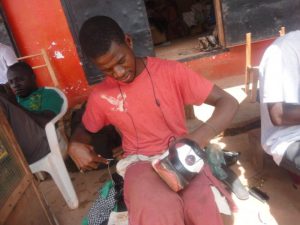
A Liberian journalist taking part in the Foundation’s Wealth of Nations programme has helped force a U-turn after he reported on dozens of students who had had their funding cut by Liberia’s national oil company, NOCAL.
NOCAL hit the headlines in June 2015 when it suddenly announced it was close to bankruptcy. The story figured strongly in Liberia’s news agenda for weeks, with reporters asking what went wrong and who was to blame. But one journalist was asking a very different question.
Jefferson Massah, from Radio Gbarnga – a station based about 200 km from Liberia’s capital, Monrovia – was interested in NOCAL’s scholarship scheme. This was set up to “harness and nurture the talent of our youth to advance the Republic of Liberia”, according to NOCAL’s website, and it funded students to study a range of disciplines – primarily, thought not exclusively, concerning the energy sector.
Jefferson was prompted to investigate this after a Thomson Reuters Foundation and New Narratives workshop on oil reporting which took place shortly before NOCAL’s collapse. The workshop was part of the Foundation’s pan-African Wealth of Nations programme, funded by Norad. During it, NOCAL representatives were invited to attend and explain the company’s activities including the scholarship scheme.
Jefferson then applied for, and received, a small reporting grant from the programme as well as ongoing editorial guidance.
Jefferson wanted to find out whether NOCAL’s collapse had affected the scholars, and he focussed his story on Cuttington University, located in the same region as Radio Gbarnga. He found that all 34 Cuttington students who were funded by NOCAL were being sent home.
He explains: “I actually started my investigation into NOCAL’s scholarship scheme at Cuttington when we were asked to submit story ideas following our training in Monrovia. Then in late July the university released a memo indicating it could no longer accommodate NOCAL’s scholarship students due to the huge arrears.
“In my first report, I highlighted the concerns of the affected students through an interview with three of the beneficiaries, another interview with university administration and also contacted NOCAL to speak on the matter but the oil company declined at the time. The report was produced and aired on Radio Gbarnga for two weeks. Two weeks after airing, another memo emerged from the university’s finance office which indicated NOCAL made payment for four students out of the 34 it sponsors at the university. One of the four was featured in my report.
“Again, I decided to do a follow up story on the new development. In the second report, I featured students that were not among the lucky four at the time as well as one of those whose arrears were settled, called Augustine Teah. Augustine was a senior student when he dropped out of school as a result of NOCAL’s scholarship collapse – he had to go back to mending shoes on the market.
“The second production was aired October 20, 2015 and repeated on October 24. Three days later we got information from the university that NOCAL had finally made payment for all of its scholarship students. Our persistence through the support of the Thomson Reuters Foundation and New Narratives actually contributed to the pressure on NOCAL to make swift payment.
“In the past two days I have received several calls from most of the students benefiting from the scholarships lauding me for the pivotal role played in highlighting their plight. This was my first time covering the oil sector in any way as a journalist – and if I had not been involved with the Thomson Reuters Foundation/New Narratives programme, I would not have covered this story.”
